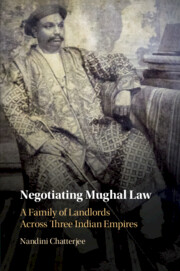This book, and the materials it is based on, uses many words that are shared across Arabic, Persian and Hindi. When transliterating those words in the Latin script, I have relied on the Library of Congress Romanization tables for Persian and Hindi. The LOC system offers accurate one-to-one correspondence in orthography and also the best intuitive fit with the phonetic patterns of the Persianate world, which would help the reader who does not read the Arabic script. The only deviation from this system is the transliteration of the diphthong represented by ‘au’, for which I find the LOC-recommended ‘aw’ producing visually unfamiliar results for common names and words. I have indicated vowel lengths but I have not always transliterated the word terminal silent h or the ta marbuta. I have followed Indian pronunciation in transliterating the vowel before the word final –h, so nāma, not nāmah or nāme. For a small number of Arabic-origin words, such as ḥadīt̲h̲, I have used the LOC Romanization system for Arabic. I have retained the transliteration choices made by other authors in book titles, not added diacritic marks for person names and have utilised standard Indian-English orthography for the names of well-known figures, such as Aurangzeb Alamgir.
The documents used in this book use a variety of calendars, most commonly, the Hijri Qamri, but also the Islamic months in combination with regnal year (Julus). The conversion of Julus dates represents serious challenges, especially since the materials cluster in the reign of the emperor who was crowned twice. An explanation of the conversion formula used is presented in the Appendix. There are also Vikram Saṃvat and Faslī calendars in use, which, being solar years, are converted simply by subtracting/adding years, and there is also the Turkish twelve-year cycle, which, thankfully, is only present in combination with other calendars.



